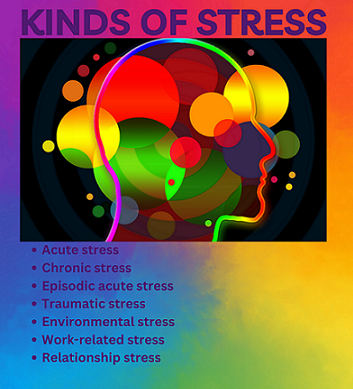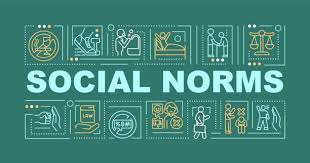Stress is an unavoidable part of life, affecting individuals in various ways. While we often use the term “stress” broadly, it’s important to recognize that there are different kinds of stress, each with its unique characteristics and impacts. In this blog, we’ll explore the various kinds of stress, their causes, symptoms, and management strategies to help you better understand and navigate through stressful situations.
1. Acute Stress
Acute stress is the most common kind and is typically short-term in nature. It is often triggered by specific events or situations, such as a job interview, a presentation, or a deadline. Acute stress can lead to a range of physical and emotional symptoms, including increased heart rate, sweating, anxiety, and irritability. While acute stress is manageable and usually subsides once the stressor is removed, prolonged exposure can have negative health consequences.
2. Chronic Stress
Chronic stress is long-term and persists over an extended period, often resulting from ongoing situations or conditions such as financial problems, work-related issues, or relationship conflicts. Unlike acute stress, chronic stress can have a more significant impact on physical and mental health. It is associated with an increased risk of conditions such as hypertension, heart disease, depression, and anxiety disorders.
3. Episodic Acute Stress
Episodic acute stress occurs when individuals experience frequent episodes of acute stress, leading to a pattern of recurring stress reactions. This type of stress is commonly observed in individuals who are prone to worry, perfectionism, or high levels of self-imposed pressure. People with episodic acute stress often feel overwhelmed, irritable, and anxious, leading to difficulties in managing daily tasks and responsibilities.
4. Traumatic Stress
Traumatic stress results from exposure to traumatic events or experiences, such as accidents, natural disasters, or acts of violence. Traumatic stress can have a profound impact on an individual’s psychological well-being, leading to symptoms such as flashbacks, nightmares, hypervigilance, and emotional numbness. It can also manifest as post-traumatic stress disorder (PTSD), a debilitating condition that requires specialized treatment and support.
5. Environmental Stress
Environmental stress refers to stressors stemming from external factors such as noise pollution, overcrowding, pollution, or socioeconomic disparities. These stressors can have a cumulative impact on individuals’ well-being, contributing to feelings of frustration, irritability, and helplessness. Environmental stress can also exacerbate existing health conditions and affect overall quality of life.
6. Work-Related Stress
Work-related stress is prevalent in today’s fast-paced work environments and can arise from various factors such as excessive workload, job insecurity, lack of autonomy, and interpersonal conflicts. Chronic work-related stress can lead to burnout, a state of physical, emotional, and mental exhaustion characterized by feelings of cynicism, detachment, and reduced professional efficacy. It can also contribute to absenteeism, decreased productivity, and increased turnover rates in organizations.
7. Relationship Stress
Relationship stress encompasses conflicts, disagreements, or challenges within interpersonal relationships, including romantic partnerships, family dynamics, or friendships. Unresolved relationship issues can lead to chronic stress and negatively impact mental and emotional well-being. Relationship stress can manifest as feelings of frustration, resentment, loneliness, and dissatisfaction with interpersonal connections.
Causes and Consequences of Different Stress Types
Understanding the underlying causes and consequences of each stress kind is crucial for effective stress management. While the triggers may vary from person to person, the physiological and psychological responses to stress are similar across different kinds. Prolonged exposure to stress can lead to a range of health problems, including:
- Mental health disorders such as anxiety, depression, and post-traumatic stress disorder (PTSD).
- Physical health issues such as cardiovascular diseases, gastrointestinal problems, and weakened immune function.
- Behavioral changes include increased substance abuse, unhealthy coping mechanisms, and impaired decision-making.
Managing Different Types of Stress: Practical Strategies
Acute Stress Management: Practice relaxation techniques such as deep breathing, meditation, or progressive muscle relaxation to alleviate acute stress symptoms. Engage in physical activity, prioritize self-care, and seek social support to cope with short-term stressors effectively.
Chronic Stress Management: Identify sources of chronic stress and implement lifestyle changes to address them. Establish healthy boundaries, prioritize time management, and practice stress-reduction techniques regularly. Seeking professional support through therapy or counseling can also be beneficial in managing chronic stress.
Episodic Acute Stress Management: Develop coping skills to manage episodic acute stress, including problem-solving, time management, and cognitive restructuring. Practice self-awareness and recognize early signs of stress to intervene proactively and prevent recurrent episodes.
Traumatic Stress Management: Seek professional help from mental health professionals specializing in trauma therapy. Utilize evidence-based treatments such as cognitive-behavioral therapy (CBT), eye movement desensitization and reprocessing (EMDR), or exposure therapy to address trauma-related symptoms effectively.
Environmental Stress Management: Implement strategies to mitigate environmental stressors, such as creating a calming home environment, minimizing exposure to noise pollution, and practicing relaxation techniques. Engage in nature-based activities, such as hiking or gardening, to counteract the effects of urban stressors.
Work-related Stress Management: Advocate for workplace policies that promote work-life balance, employee well-being, and stress reduction initiatives. Practice effective time management, set realistic goals, and communicate openly with supervisors and colleagues to manage work-related stress effectively.
Relationship Stress Management: Prioritize communication, empathy, and conflict resolution skills in interpersonal relationships. Seek couples therapy or family counseling to address underlying issues and improve relationship dynamics. Set boundaries and practice self-care to maintain healthy relationships while managing stress effectively.
Conclusion
In conclusion, stress comes in various forms, each with its own set of causes, symptoms, and consequences. By understanding the different kinds of stress and their underlying mechanisms, individuals can develop effective coping strategies and management techniques to navigate through challenging situations. Whether it’s acute stress triggered by specific events or chronic stress stemming from ongoing life challenges, recognizing the signs and addressing stressors proactively is essential for maintaining overall well-being and resilience.




